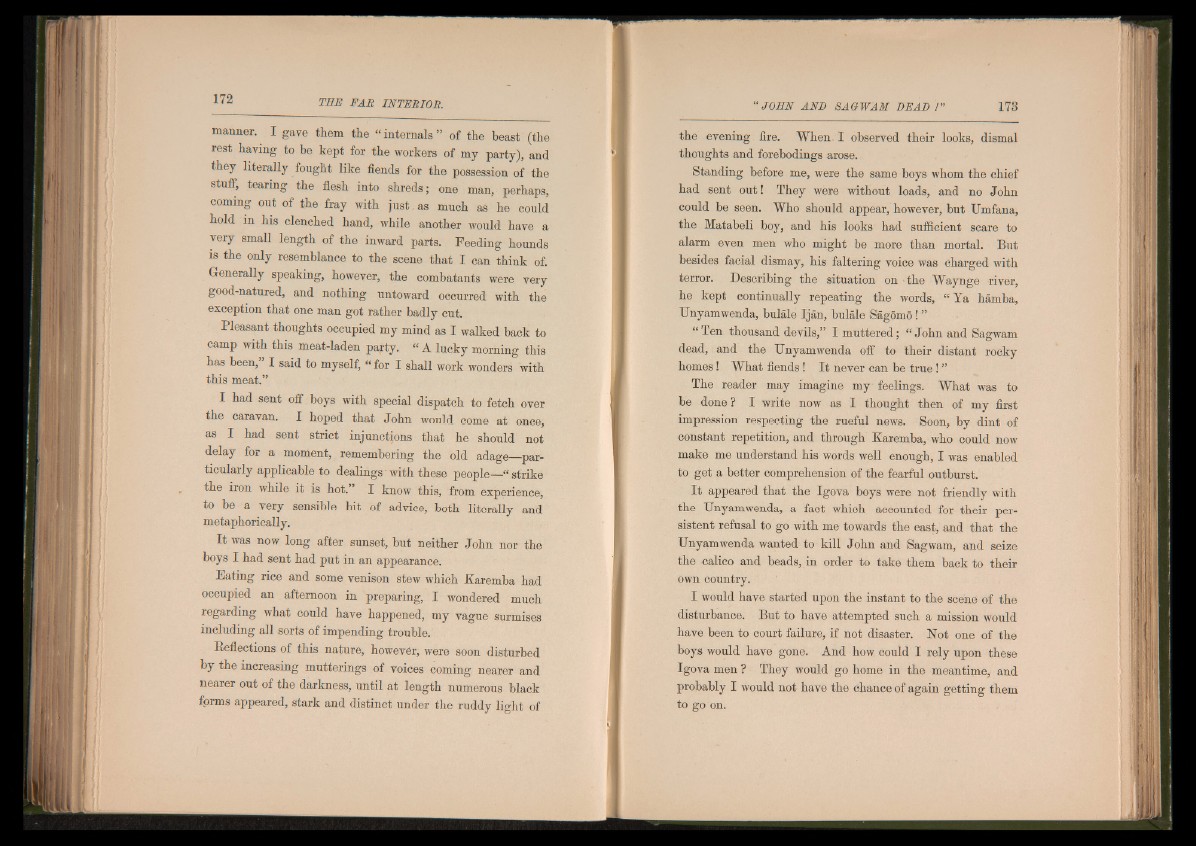
manner. I gave them the “ internals” of the beast (the
rest having to he kept for the workers of my party), and
they literally fought like fiends for the possession of the
stuff, tearing the flesh into shreds; one man, perhaps,
coming out of the fray with ju st. as much as he could
hold m his clenched hand, while another would have a
very small length of the inward parts. Feeding hounds
is the only resemblance to the scene that I can think 0f.
Generally speaking, however, the combatants were very
good-natured, and nothing untoward occurred with the
exception that one man got rather badly cut.
Pleasant thoughts occupied my mind as I walked back to
camp with this meat-laden party. “ A lucky morning this
has been, I said to myself, “ for I shall work wonders with
this meat.”
I had sent off boys with special dispatch to fetch over
the caravan. I hoped that John would come at once,
as I had sent strict injunctions that he should not
delay for a moment, remembering the old adage—particularly
applicable to dealings-with these peoples“ strike
the iron while it is hot.” I know this, from experience,
to be a very sensible bit of advice, both literally and
metaphorically.
It was now long after sunset, but neither John nor the
boys I had sent had put in an appearance.
Eating rice and some venison stew which Karemba had
occupied an afternoon in preparing, I wondered much
regarding what could have happened, my vague surmises
including all sorts of impending trouble.
Reflections of this nature, however, were soon disturbed
by the increasing mutterings of voices coming nearer and
nearer out of the darkness, until at length numerous black
forms appeared, stark and distinct under the ruddy light of
the evening fire. When I observed their looks, dismal
thoughts and forebodings arose.
Standing before me, were the same boys whom the chief
had sent o u t! They were without loads, and no John
could be seen. Who should appear, however, but Umfana,
the Matabeli boy, and his looks had sufficient scare to
alarm even men who might be more than mortal. But
besides facial dismay, his faltering voice was charged with
terror. Describing the situation on the Waynge river,
he kept continually repeating the words, “ Ya hamba,
Unyamwenda, bulale Ijan, bulale Sagomo! ”
“ Ten thousand devils,” I muttered; “ John and Sagwam
dead, and the Unyamwenda off to their distant rocky
homes! What fiends ! I t never can be tru e ! ”
The reader may imagine my feelings. What was to
be done? I write now as I thought then of my first
impression respecting the rueful news. Soon, by dint of
constant repetition, and through Karemba, who could now
make me understand his words well enough, I was enabled
to get a better comprehension of the fearful outburst.
I t appeared that the Igova boys were not friendly with
the Unyamwenda, a fact which accounted for their persistent
refusal to go with me towards the east, and that the
Unyamwenda wanted to kill John and Sagwam, and seize
the calico and beads, in order to take them back to their
own country.
I would have started upon the instant to the scene of the
disturbance. But to have attempted such a mission would
have been to court failure, if not disaster. Not one of the
boys would have gone. And how could I rely upon these
Igova men ? They would go home in the meantime, and
probably I would not have the chance of again getting them
to go on.